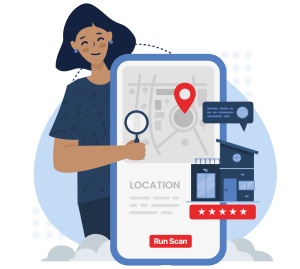Marketing a business with multiple locations comes with unique challenges. Whether you're managing a franchise, a retail chain, or a service-based business with several service areas, your marketing strategy needs to balance brand consistency with localized outreach.
A strong multi-location business marketing plan includes optimizing your website, managing local listings, leveraging customer reviews, and ensuring each location has visibility in local search results.
Below, we'll explore key strategies that will help you attract and convert more customers across all your locations.
1. Optimize Your Multi-Location Business Website for Local Search
Your website should serve as a central hub for all locations while ensuring each individual location has a strong local presence. Instead of listing all locations on a single page, create dedicated, optimized local landing pages for each location.
Each page should include:
- The location's name, address, and phone number (NAP)
- Unique, localized content relevant to the area
- Embedded Google Maps for easy navigation
- Information about location-specific services, promotions, or events
- Customer testimonials for that location
By structuring your site this way, you'll improve local search visibility and enhance the user experience for potential customers looking for information about a specific location.
2. Claim and Optimize Google Business Profiles for Each Location
A well-optimized Google Business Profile (GBP) is crucial for ranking in local search results on Google Search and Maps. Each business location should have its own GBP listing with accurate and up-to-date information, including:
- Categories
- Business hours
- Contact information
- Services offered
- High-quality photos
- Link to location-specific landing page
Google uses this information to rank businesses in local searches, so keeping your profiles complete and optimized will improve each location's local marketing performance.
3. Gather and Manage Reviews for Each Location
Customer reviews are a key ranking factor in local marketing for multi-location businesses. Not only do they influence consumer trust, but they also impact search rankings. Encourage customers to leave reviews for specific locations by:
- Sending automated review requests via email or SMS after a purchase
- Responding to all reviews (both positive and negative)
- Highlighting positive reviews in marketing materials
- Providing customers with a direct link to leave a Google Review
Multi-location businesses should also monitor and analyze review trends across locations to identify operational strengths and weaknesses.
Pro tip: Try using Local Falcon's AI-powered Reviews Analysis tool to perform lightning-fast sentiment analysis across all your Google reviews!
4. Use Local Rank Tracking to Measure SEO Performance
Local SEO performance can vary greatly by location, which is why businesses need to track search rankings at a granular level. A multi-location business marketing strategy should include regular rank tracking for local keywords.
Using a local rank tracking tool like Local Falcon, you can:
- Monitor keyword rankings for each location
- Identify areas where certain locations are underperforming
- Adjust SEO strategies based on real data
- Track and analyze competitors' rankings to identify opportunities to outrank them
Regular rank tracking helps ensure your locations stay competitive in search results, especially in high-competition industries and areas.
5. Leverage Localized Social Media Marketing
Each business location should have its own localized social media presence to engage with its community. While your main brand account provides overall messaging, creating location-specific Facebook pages or Instagram profiles can drive more targeted engagement.
Encourage individual locations to:
- Share local events and promotions
- Post and share user-generated content from customers
- Respond to comments and messages quickly
This approach helps build stronger relationships with local audiences and increases foot traffic.
6. Run Location-Based Paid Advertising Campaigns
For businesses looking to expand their reach quickly, paid advertising can be an effective strategy. Platforms like Google Ads and Facebook allow businesses to target audiences based on geographic location. Google LSAs are another good option for multi-location service-area businesses.
Best practices for local paid ad campaigns for multi-location business marketing include:
- Creating separate ad groups for each location
- Using location extensions in Google Ads
- Targeting local keywords in ad copy
A well-structured advertising strategy ensures you're reaching the right audience in each area while maximizing your ad spend.
7. Build Local Partnerships and Community Engagement
Multi-location businesses can benefit from community engagement and partnerships to strengthen their local presence. Consider:
- Sponsoring local events or sports teams
- Partnering with nearby businesses for cross-promotions
- Hosting in-person events or workshops
These efforts build brand recognition and trust while driving more foot traffic to your locations. Certain partnerships can also earn you organic backlinks to your multi-location business website, which helps improve its SEO.
8. Ensure Consistency in Branding Across All Locations
While localization is important, brand consistency is equally crucial in multi-location business marketing. Customers should have a unified experience no matter which location they visit.
Ensure consistency by:
- Using the same brand colors, logos, and messaging across all locations
- Training employees on customer service and brand values
- Maintaining uniform marketing materials
A strong, cohesive brand helps build customer loyalty across all locations. But it's important to remember that consistent branding isn't just for in-person visits.
For example, each location's Google Business Profile should be consistent, so customers get the same local search experience no matter where they're located. This is where deciding between a centralized or a localized approach to local SEO comes in.
Final Thoughts
Successfully marketing a multi-location business requires a combination of local and enterprise-level strategies.
By optimizing your multi-location business website, leveraging rank tracking for your multiple location site and GBP listings, managing local marketing for multi-location businesses, and ensuring each location has a strong digital presence, you can maximize visibility and drive more customers to every branch.
With the right tools and ongoing optimization, multi-location businesses can dominate local search results and maintain a competitive edge in all areas they serve!


